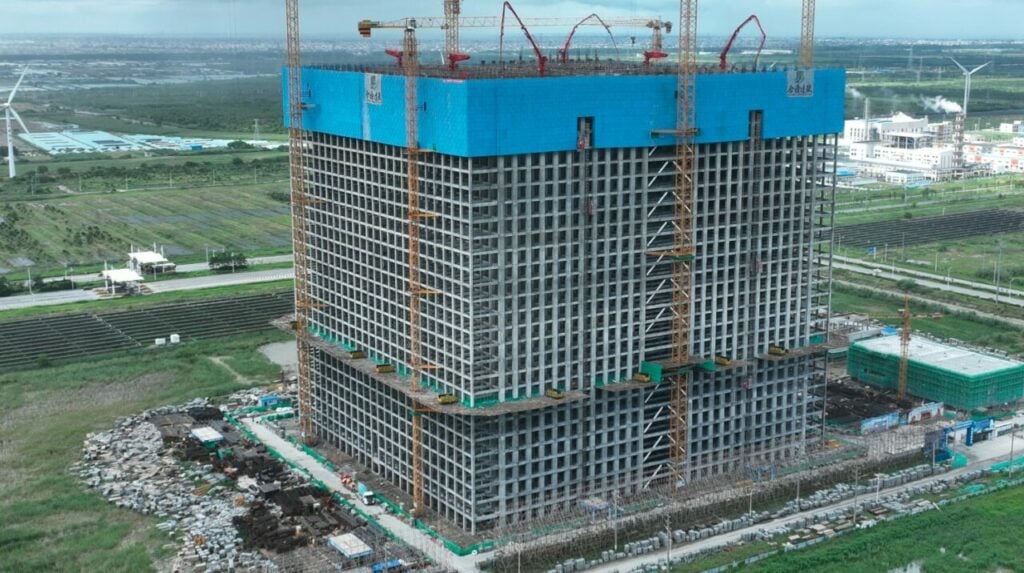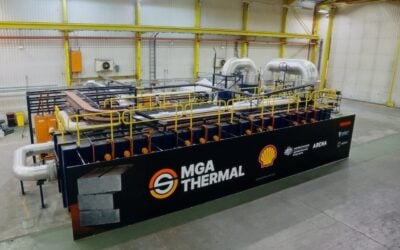
Commissioning has been completed on the first commercial-scale project using Energy Vault’s gravity energy storage technology, while the firm has also secured a 400MWh BESS order for a project in Australia.
However, Energy Vault expects its revenues this year to be 70-85% lower than in 2023.
The 25MW/100MWh system in Rudong, China, pictured above, has passed commissioning by customer China Tianying (CNTY) , a waste and environmental services group, and will start commercial operations once final provincial and state approvals have been granted.
It is being built by CNTY and developer Atlas Renewable under a licensing agreement with New York Stock Exchange (NYSE) listed Energy Vault for its EVx gravity energy storage system technology, and is the first non-pumped hydro gravity-based system of its size.
Try Premium for just $1
- Full premium access for the first month at only $1
- Converts to an annual rate after 30 days unless cancelled
- Cancel anytime during the trial period
Premium Benefits
- Expert industry analysis and interviews
- Digital access to PV Tech Power journal
- Exclusive event discounts
Or get the full Premium subscription right away
Or continue reading this article for free
That licensing agreement, which sees Energy Vault paid a royalty fee, has now been extended from 7.5 years to 15 years. Atlas Renewable is launching numerous projects across China using the EVx tech and late last year started building three more, part of an eight-project pipeline totalling over 3.7GWh.
Robert Piconi, chairman and CEO of Energy Vault said: “This testing demonstrates that gravity energy storage technology promises to play a key role in supporting the energy transition and decarbonization goals of China, the world’s largest energy storage market.”
The gravity storage technology has its fair share of critics, however, and we put some of these criticisms to Piconi in an interview last year (Premium access).
BESS order in Australia for Ayala Group’s local IPP arm
The interview also touched on Energy Vault’s expansion into short-duration battery energy storage system (BESS) integration, and the firm today announced a two-stage 400MWh order for developer and independent power producer (IPP) ACEN Australia, part of Philippines-based holdings firm Ayala Group.
Energy Vault will provide ACEN AUstralia with the BESS technology for two separate projects that are both connected to ACEN’s 720MW New England Solar project in New South Wales, which will provide energy at peak demand hours as the region reduces its coal generation.
The announcement didn’t explain why the order has been characterised as being split between a 50MW/100MWh project and another 150MW/300MWh project, both connected to the solar plant. It may be related to the two stages of New England Solar’s construction, with 400MW already online and the remaining c.350MW under construction.
Q1 2024 results
The firm also released its financial results for the first three months of 2024, during which it booked US$7.8 million in revenues mainly from BESS projects with utility NV Energy and independent power producer (IPP) Jupiter Power in the US.
It reduced its net loss and adjusted EBITDA figures by 32% and 24% to US$21.1 million and US$14.4 million respectively.
However, the US$7.8 million was a 30% fall year-on-year which it in part attributed to seasonality and timing of revenue associated with licenses for its gravity energy storage technology.
Other BESS providers Fluence, Wartsila and Stem Inc all said the same thing about timing of revenues and projects this week to explain falling revenues at the start of the year (though Energy Vault’s much later entry to the BESS space makes it harder to compare).
For full-year 2024, it is guiding for US$50-100 million revenues, a 70-85% fall after posting US$341 million last year (Premium access).
Energy-Storage.news’ publisher Solar Media will host the 1st Energy Storage Summit Australia, on 21-22 May 2024 in Sydney, NSW. Featuring a packed programme of panels, presentations and fireside chats from industry leaders focusing on accelerating the market for energy storage across the country. For more information, go to the website.
Energy-Storage.news’ publisher Solar Media will host the 2nd Energy Storage Summit Asia, 9-10 July 2024 in Singapore. The event will help give clarity on this nascent, yet quickly growing market, bringing together a community of credible independent generators, policymakers, banks, funds, off-takers and technology providers. For more information, go to the website.





